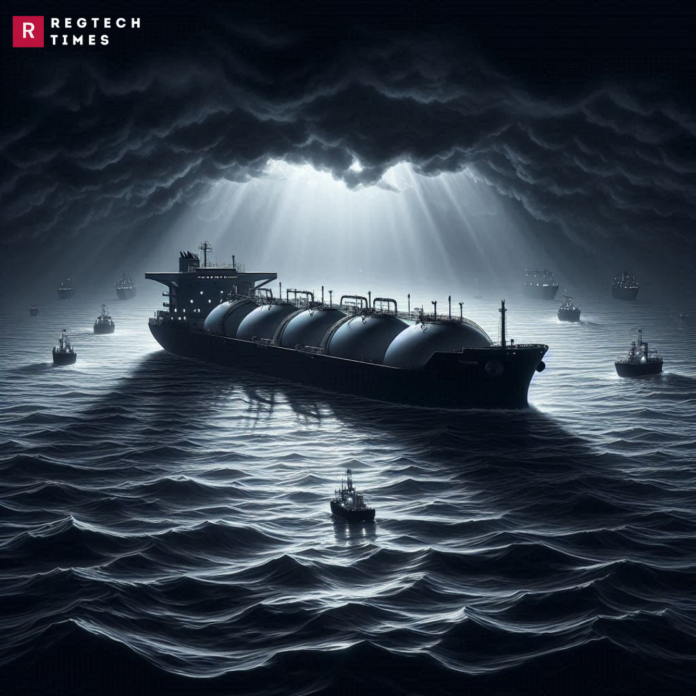In a seemingly ordinary apartment in India, crayon marks on the wall tell a different story. This sparsely furnished space is the registered address of Ocean Speedstar Solutions, a company playing a crucial role in Russia’s efforts to circumvent US energy sanctions. Located about 90 miles southeast of Mumbai, this apartment is linked to a network supporting a fleet of tankers that transport liquefied natural gas (LNG) from Russia’s Arctic facilities.
The Hidden Operations
Since June, the apartment has been associated with a man who, without prior experience in the energy industry, became the sole director of Ocean Speedstar. This individual registered his name at the behest of a friend, unknowingly connecting himself to a vast network operating from Dubai to India and China. This network is designed to create a shadow fleet, which helps transport gas from a major Russian LNG facility known as Arctic LNG 2.
Russia, aiming to continue its trade despite Western sanctions imposed after its actions in Ukraine, has developed a complex strategy. Experts describe this approach as “complicate, confuse, and delay.” It involves recruiting individuals who may be financially motivated to take on roles within this shadowy operation. Russia manages the planning and scheduling, while the recruited individuals often remain unaware of the larger implications of their involvement.
Arctic LNG 2: A Key Project
The Arctic LNG 2 facility is crucial for Russia’s energy ambitions. Officially launched in December, it represents a national pride project for Russia, showcasing its technological capabilities while attempting to assert that sanctions will not hinder its trade. Following the invasion of Ukraine, Russia’s oil and gas sectors have built what is known as a “dark fleet,” a network of ships operating under the radar to export oil. The aim now is to replicate this model for LNG.
To further its goals, Russia intends to triple its LNG exports by 2030, a vital part of its economic strategy after losing Europe as a primary gas customer. The Russian government sees LNG as a cornerstone for a post-conflict economy, emphasizing its importance during official speeches. The desire to penetrate the Asian market, particularly China, drives Russia’s LNG strategy, especially as the demand for natural gas is expected to grow significantly in the coming years.
Sanctions and Challenges
As Russia tries to maintain its LNG exports, it faces significant challenges from international sanctions. The Arctic LNG 2 facility was sanctioned even before it began production, prompting buyers to steer clear for fear of repercussions. This situation has effectively trapped Russian gas in the Arctic, making it difficult to find markets for this energy resource.
In response to the sanctions, Russia has been forced to take bold steps, such as offering discounts to attract buyers. Reports indicate that some vessels have been involved in deceptive practices, like “spoofing,” which involves masking their actual locations to evade detection by authorities. This tactic highlights the lengths to which Russia is willing to go to ensure its gas continues to flow to the market.
Despite these efforts, the logistics remain complicated. Arctic LNG 2 has only managed to export a few shipments since early August, and there are concerns about the vessels being able to navigate the icy waters as winter approaches. This has led to urgency in getting shipments out before the seas freeze.
The situation is complicated further by the involvement of various companies, including those based in Dubai and India, which serve as middlemen to help Russia circumvent sanctions. Some shipping companies and brokers have even refused to work with certain vessels due to concerns about their connections to the Russian shadow fleet.
As the situation unfolds, it’s clear that Russia is determined to keep its energy exports alive, despite significant hurdles. The complexity of the operations, coupled with the ongoing challenges posed by sanctions, creates a highly volatile environment. The efforts to build a shadow fleet and the desperate measures being employed underscore the high stakes involved in this energy conflict.
Russia continues to push forward with its LNG plans, believing in the importance of its role in the global energy market. The outcome of this situation remains uncertain, but the actions taken by various players involved reflect a broader struggle over energy resources in the face of geopolitical tensions.


